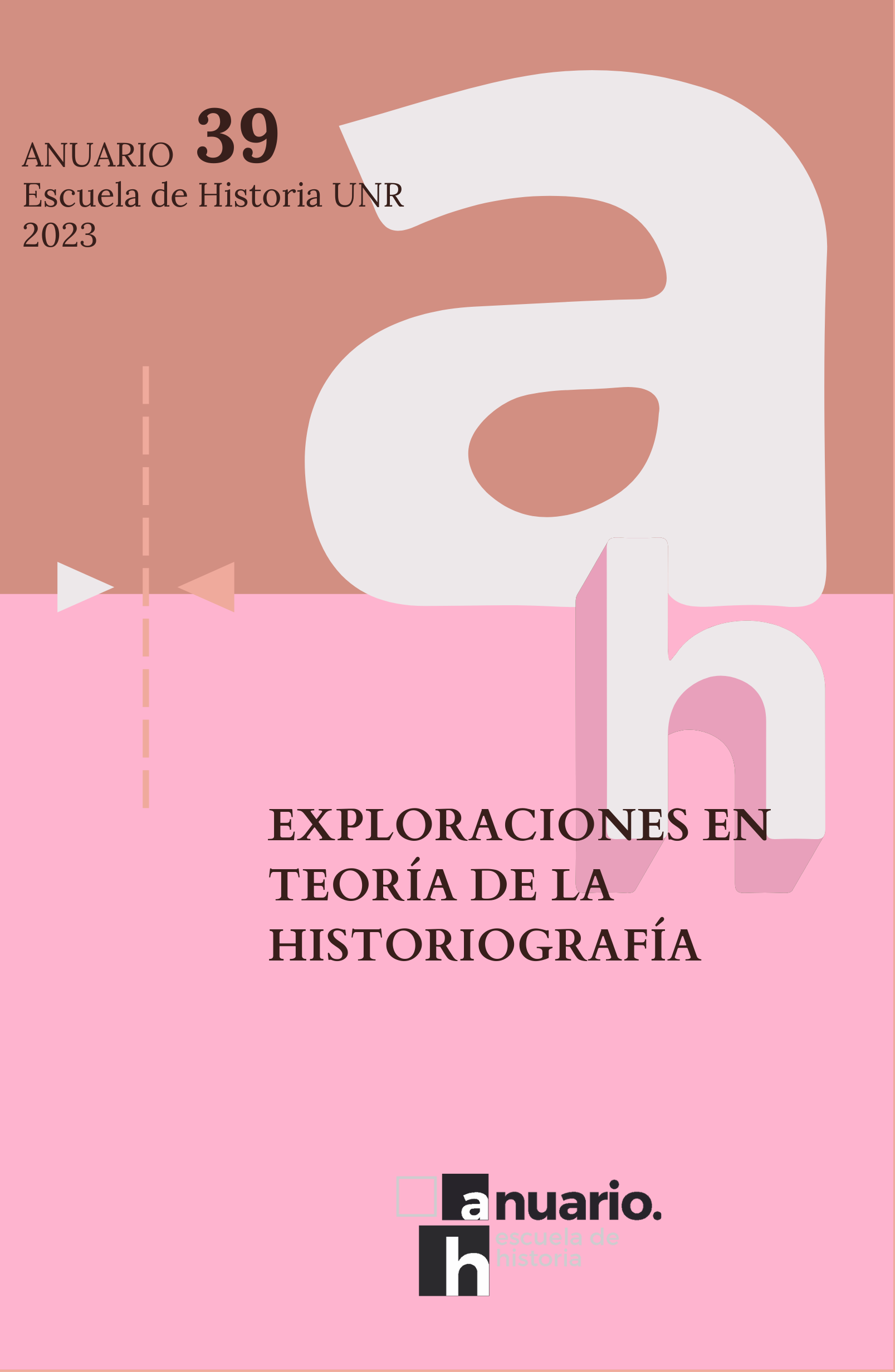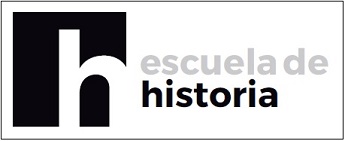The Historian´s Voice. The “Self” in Historiographical Accounts (1980-2023)
DOI:
https://doi.org/10.35305/aeh.vi39.402Abstract
Modern Western historiography was founded under the paradigm of scientism and objectivity. As a result, the discipline adopted the narrative strategy of the omniscient or extradiegetic narrator, or the use of the plural "we" in the Hispanic context, a practice which supposedly prevented historians' subjectivities from leaking into accounts of the past. However, since the 1980s, new narrative strategies have emerged that have challenged this model from both a formal and epistemological standpoint. This emergence of the "self" in the field of historiography has been defined by Enzo Traverso as “subjective writing”. The article analyses this "autobiographical turn" in Western historiography, paying particular attention to its manifestations in its two main epicentres - the academic world in the United States and France - along with other pioneering works from Australia, Spain, Italy, and the United Kingdom. The article presents two levels of analysis. On the one hand, it establishes a classification system which divides subjective writing within contemporary historiography into four categories: autobiographies, ego-histoire, autobiographical or family “windows”, and ethnographic field diaries. The first two categories are explicitly memoir-like texts, while the latter two consist of works considered by interpretive communities of experts as historical research. On the other hand, it asks whether historians have used these formats in an attempt to be transparent with readers about the role of their subjectivities in the construction of knowledge, or if these formats have merely been used in functional and/or stylistic ways. In cases where self-reflection occurs, a distinction is made between texts with a passive focus (whose reflections are related to previous research in which the author can no longer intervene), and active (when reflections are conducted in parallel with the author's own research and, therefore, can impact the construction of knowledge).Downloads
References
Aurell, Jaume (ed.) (2012). La historia de España en primera persona. Autobiografías de historiadores hispanistas. Barcelona: Editorial Base.
------------------------ (2016). Theoretical Perspectives on Historians' Autobiographies: From Documentation to Intervention. Abingdon: Routledge. https://doi.org/10.4324/9781315678030
Barley, Nigel (1986). The Innocent Anthropologist: Notes from a Mud Hut. London: Penguin.
Behar, Ruth (1994). 'Dare We Say I? Bringing the Personal into Scholarship', The Chronicle of Higher Education, 29 de junio de 1994.
--------------- (1996). The Vulnerable Observer: Anthropology that Breaks your Heart. Boston: Beacon Press.
Bentley, Michael (1999). Modern Historiography: An Introduction. London: Routledge.
---------------------- (2005). Modernizing England's Past: English Historiography in the Age of Modernism, 1870-1970. Cambridge: Cambridge University Press. https://doi.org/10.1017/CBO9780511616181
Bourdieu, Pierre (1997). Méditations pascaliennes. Paris: Seuil.
Bragrança, Manuel y Louwagie, Fransiska (eds.) (2018). Ego-histories of France and the Second World War: Writing Vichy. Cham: Palgrave MacMillan. https://doi.org/10.1007/978-3-319-70860-7
Capote, Truman (1966). In Cold Blood. New York: Random House.
Carr, Edward H. (1987). What is History? Harmondsworth: Penguin Books.
Cercas, Javier (2001). Soldados de Salamina. Barcelona: Tusquets.
----------------- (2009). Anatomía de un instante. Barcelona: Random House.
----------------- (2014). El impostor. Barcelona: Random House.
----------------- (2020). El monarca de las sombras. Barcelona: Vintage.
Certeau, Michel de (2005). La escritura de la historia. México DF: Universidad Iberoamericana.
Collingwood, Robin George (1939). An Autobiography. London: Oxford University Press.
Conway, Jill Ker (1992). The Road from Coorain. London: Minerva.
Duberman, Martin (1993). Black Mountain: An Exploration in Community. New York: W. W. Norton.
Eire, Carlos (2003). Waiting for Snow in Havana: Confessions of a Cuban Boyhood. London: Simon & Schuster.
Eley, Geoff (2005). Crooked Line: From Cultural History to the History of Society. Ann Arbor: University of Michigan Press. https://doi.org/10.3998/mpub.137664
Elias, Norbert (1983). Compromiso y distanciamiento. Ensayos de sociología del conocimiento. Barcelona: Península.
Evans, Richard J. (2008). In Defence of History. London: Granta.
Fraser, Ronald (1984). In Search of a Past: The Manor House, Amnersfield, 1933-1945. London: Verso.
Freedman, Diane P. y Frey, Olivia (eds.) (2003). Autobiographical Writing Across the Disciplines: A Reader. Durham: Duke University Press. https://doi.org/10.2307/j.ctv125jkhj
Friedländer, Saul (2000). History, Memory, and the Historian: Dilemmas and Responsibilities. New German Critique, 80. https://doi.org/10.2307/488629
Gil Andrés, Carlos, Piedralén (2010). Historia de un campesino. De Cuba a la Guerra Civil. Madrid: Marcial Pons.
Ginzburg, Carlo y Prosperi, Adriano (1975). Giochi di Pazienza. Un seminario sul 'Beneficio di Cristo'. Torino: Einaudi.
Goldstein, Slavok (2013). 1941, el año que retorna. Barcelona: Edicions Còmplices.
Gorra, Michael (1995). The Autobiographical Turn. Transition, 68. https://doi.org/10.2307/2935297
Haraway, Dorothy (1988). Situated Knowledges: The Science Question in Feminism and the Privilege of Partial Perspective. Feminist Studies, 14-38. https://doi.org/10.2307/3178066
Harding, Sandra (1986). The Science Question in Feminism. Ithaca: Cornell University Press.
Hobsbawm, Eric (1989). The Age of Empire, 1875-1914. New York: Vintage Books.
-------------------- (2003). Interesting Times: A Twentieth-Century Life. London: Abacus.
Izquierdo Martín, Jesús y Sánchez León, Pablo (2006). La guerra que nos han contado. 1936 y nosotros. Madrid: Alianza.
Jablonka, Ivan (2015). Historia de los abuelos que no tuve. Buenos Aires: Libros del Zorzal.
------------------ (2016). La historia es una literatura contemporánea. Manifiesto por las ciencias sociales. Buenos Aires: Fondo de Cultura Económica.
------------------ (2017). Laëtitia o el fin de los hombres. Barcelona: Anagrama.
LaCapra, Dominick (1985). History & Criticism. Ithaca: Cornell University Press.
Luzzato, Sergio (2015). Partisanos. Una historia de la resistencia. Madrid: Debate.
------------------ (2019). Max Fox o le relazioni pericolose. Torino: Einaudi.
Mailer, Norman (1979). The Executioner's Song. London: Hutchinson & Co.
Marco, Jorge (ed.) (2022). La guerra de España en nuestras raíces. Ancestros, subjetividad y el oficio del historiador. Madrid: Postmetrópolis.
----------------- (2022). “El historiador introspectivo. Mirar hacia dentro para mirar hacia fuera”, en Jorge Marco (ed.), La guerra de España en nuestras raíces. Ancestros, subjetividad y el oficio del historiador. Madrid: Postmetrópolis.
Martín Sánchez, Pablo (2012). El anarquista que se llama como yo. Barcelona, Acantilado.
Mosse, George L. (2000). Confronting History: A Memoir. Madison: University of Wisconsin Press.
Nora, Pierre (1987). “Présentation”, en Nora, Pierre (ed.), Essais d'ego-histoire. Paris: Éditions Gallimard.
----------------- (2001). L'ego-histoire est-elle possible?. Historein: A Review of the Past and Other Stories, 3. https://doi.org/10.12681/historein.97
Passerini, Luisa y Geppert, Alexander C. T. (2001). European Ego-histoires: Historiography and the Self, 1970-2000. Historein: A Review of the Past and Other Stories, 3.
Patai, Daphnae (1994). Sick and Tired of Scholars' Nouveau Solipsism. The Chronicle of Higher Education, 23 de febrero de 1994.
Popkin, Jeremy D. (2005). History, Historians, and Autobiography. Chicago: University of Chicago Press.
----------------------- (2017). History, Historians, and Autobiography Revisited. Auto/Biography Studies, 32-3. https://doi.org/10.1080/08989575.2017.1338028
Purkiss, Diane (1996). The Witch in History: Early Modern and Twentieth-Century Representations. London: Routledge.
Rocha, Servando (2021). Todo el odio que tenía dentro. Madrid: Editorial La Felguera.
Sánchez León, Pablo e Izquierdo Martín, Jesús (2017). La guerra que nos han contado y la que no. Memoria e historia de 1936 para el siglo XXI. Madrid: Postmetrópolis.
Serna, Justo (2019). Historia y ficción. Conversaciones con Javier Cercas. Madrid: Puntos de vista.
Steedman, Carolyn Kay (2008). Landscape for a Good Woman: A Story of Two Lives. Rutgers University Press.
Traverso, Enzo (2009). A sangre y fuego. De la guerra civil europea (1914-1945). València: Publicacions de la Universitat de València.
----------------- (2020). Passés singuliers. Le 'Je' dans l'écriture de l'histoire. Montréal: Lux Éditour.
Urraca Luque, Loreto (2018). Entre hienas. Retrato de familia sobre fondo de guerra. Madrid: Editorial Funambulista.
Veyne, Paul (1971). Writing History: Essay on Epistemology. Middletown: Wesleyan University Press.
Viven, Richard (2011). The Poisoned Madeleine: The Autobiographical Turn in Historical Writing. Journal of Contemporary History, 46. https://doi.org/10.1177/0022009411403338
Wineburg, Sam (2001). Historical Thinking and Other Unnatural Acts: Charting the Future of Teaching the Past. Philadelphia: Temple University Press.
White, Hayde (1973). Metahistory: The Historical Imagination in the Twentieth-Century Europe. Baltimore: Johns Hopkins University Press.
----------------- (1978) The Content of the Form: Narrative Discourse and Historical Representation. Baltimore: John Hopkins University Press.
Zalc, Claire (2021). Z ou souvenirs d'historienne. Paris: Éditions de la Sorbonne.
Published
How to Cite
Issue
Section
License

This work is licensed under a Creative Commons Attribution-NonCommercial-ShareAlike 4.0 International License.
Los autores que publican en esta revista están de acuerdo con los siguientes términos:
Al momento de enviar sus contribuciones, los colaboradores deberán autorizar su publicación conservando los derechos de autoría, y transfiriendo a la revista todos los derechos protegidos por las leyes de propiedad intelectual que rigen en Argentina, que implican la edición para difundir la obra en soporte digital en que se aloja la revista. Deberán declarar que poseen el permiso del archivo o repositorio donde se obtuvieron los documentos que se anexan al trabajo, cualquiera sea su formato (manuscritos inéditos, imágenes, archivos audiovisuales, etc.), permiso que los autoriza a publicarlos y reproducirlos, liberando a la revista y sus editores de toda responsabilidad o reclamo de terceros.
Asimismo, los autores deben adherir a la licencia Creative Commons denominada “Reconocimiento - No Comercial- Compartir Igual CC BY-NC-SA”, mediante la cual el autor permite copiar, reproducir, distribuir, comunicar públicamente la obra y generar obras derivadas, siempre y cuando se cite y reconozca al autor original. No se permite, sin embargo, utilizar la obra con fines comerciales. Los autores podrán establecer acuerdos adicionales para la distribución no exclusiva de la versión de la obra publicada en la revista (por ejemplo, situarlo en un repositorio institucional o publicarlo en un libro), con el reconocimiento de haber sido publicado primero en esta revista.



.png)







1.jpg)
.png)














1.png)
